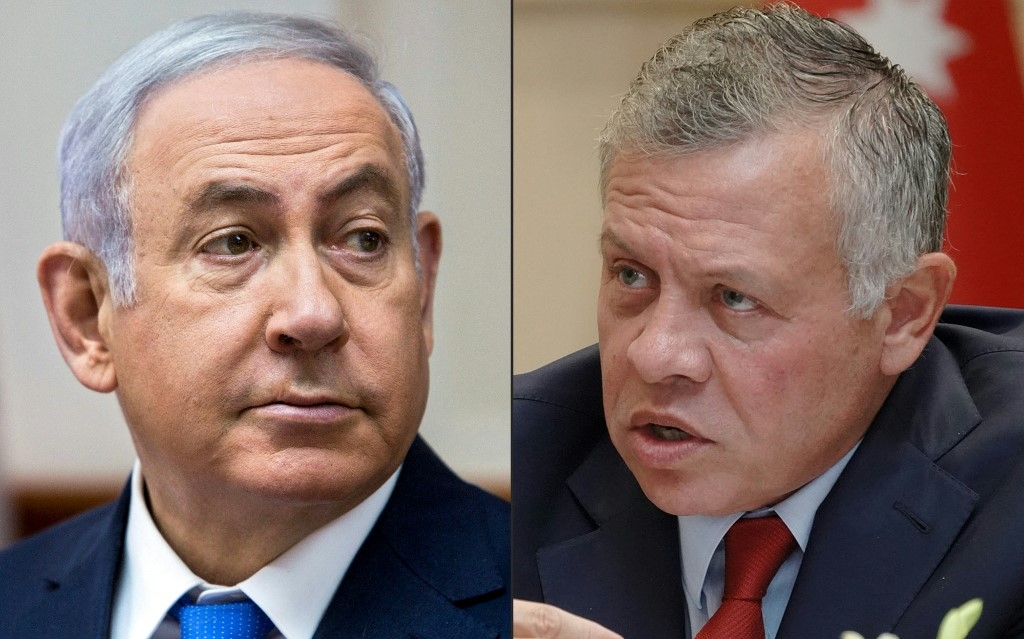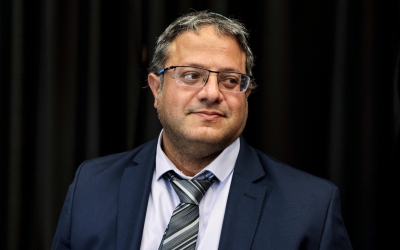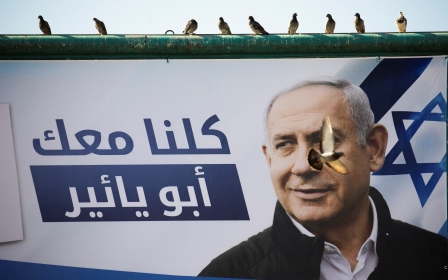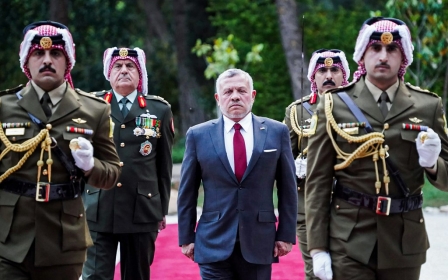Netanyahu vs King Abdullah: Israel and Jordan relationship hits low point

Israeli and Jordanian ties hit another low point last week, after Israeli Prime Minister Benjamin Netanyahu refused to approve the supply of water to Jordan as provided under the 1994 Wadi Araba peace agreement.
Netanyahu’s decision to halt the transfer of water is part of tit-for-tat row between Israel and the Hashemite kingdom that has been ongoing since March.
Israel's decision to cancel Jordanian Crown Prince Hussein bin Abdullah's visit to the Al-Aqsa Mosque compound in occupied East Jerusalem on 10 March led Amman to deny Netanyahu’s helicopter access to Jordanian airspace the very next day, as he was headed to the United Arab Emirates.
'Netanyahu has no credibility in decision-making circles in Jordan, and the communication lines with him have been broken'
- Mohammad al-Momani,
member of Jordan’s Senate
Netanyahu, meanwhile, had been looking forward to a photo opportunity with Abu Dhabi Crown Prince Mohammed bin Zayed, hoping to boost his chance amid a fierce election campaign. Though Amman gave Netanyahu clearance to fly through its airspace after several hours, he decided not to fly to the UAE.
On Friday, Jordan issued a statement calling on Israel to put an end to daily incursions by Israeli settlers into the Al-Aqsa compound under the protection of Israeli security and intelligence forces.
New MEE newsletter: Jerusalem Dispatch
Sign up to get the latest insights and analysis on Israel-Palestine, alongside Turkey Unpacked and other MEE newsletters
Jordan is the custodian of Muslim and Christian holy places in East Jerusalem according to a joint Israeli-Jordanian agreement.
Some far-right Israelis, however, have long called for the destruction of the Al-Aqsa compound - which they believe was built where the Second Jewish Temple once stood - in order for a Third Jewish Temple to be established in its place.
King Abdullah ascended to the throne in 1999, while Netanyahu has been the Israeli premier on and off since 1996. The two leaders last met in 2018.
Broken lines
Netanyahu has been described as a thorn in King Abdullah’s throat by Israeli media, and though recent tension appears to be between two leaders in a tense region, they also reflect two different approaches to security and politics in the Middle East, analysts say.
“Any Israeli premier other than Netanyahu would be better for Jordan,” Mohammad al-Momani, a member of Jordan’s Senate and former minister, told Middle East Eye.
“Netanyahu has no credibility in decision-making circles in Jordan, and the communication lines with him have been broken. He is viewed as an opportunist who will do anything to stay alive politically, even if this causes crisis and hurt bilateral relations with Jordan.”
Jordan’s former deputy prime minister, Mamdouh al-Abadi, told MEE that King Abdullah does not have faith in Netanyahu and is wary of him.
“Netanyahu is a radical right-winger and does not believe in the two-state solution or the peace process, and has an expansionist view towards Jordan," he said. "He has run into a brick wall with Jordan because of its rejection of annexation and of (former US President) Donald Trump's 'deal of the century'.”
Some of Netanyahu's allies, such as the Religious Zionism coalition, champion the notion of a Greater Israel and full Israeli control over the eastern mountains of the Jordan Valley, which they believe are part of the biblical kingdoms of Judea and Samaria.
Religious Zionism is a key to Netanyahu’s attempts to form a government after last month's general election.
According to Israeli analyst Meron Rapoport, Israel's decision to block the Jordanian crown prince’s visit to Al-Aqsa mosque was Netanyahu's signal to his far-right bloc that his future government would enforce Israeli sovereignty over the compound.
Long-running feud
However, Netanyahu’s confrontation with Jordan goes back to the reign of the current monarch's father, King Hussein, when he ordered Mossad agents to assassinate Hamas politburo leader Khaled Meshaal in Amman in 1997, before bowing to US pressure and sending an antidote to the poison used on Meshaal.
In 2017, an Israeli security guard at the Israeli embassy in Amman killed two Jordanian citizens. The guard was released in a secret deal, but Netanyahu welcomed him back to Israel as a “national hero”, which was perceived as an insult aimed at King Abdullah in Jordan.
Daoud Kuttab, an analyst of Palestinian affairs, told MEE that the long list of incidents explain King Abdullah's wariness of the Israeli premier.
“On numerous occasions, Netanyahu broke promises that were made to the king, such as preventing Jewish settlers' entry into Al-Aqsa, handing over CCTV footage of the killing of Jordanian judge Raed Zeiter in 2014, and the failure to honour the promise to investigate and hold accountable the Israeli embassy guard who killed two Jordanians," Kuttab said. "All these issues have created total mistrust."
Historically, leaders of Israel’s right-wing Likud, including Netanyahu, have always had tense ties with Jordan, according to Rapoport.
“The Likud government is no good for Jordan, no matter who’s in charge of it," he told MEE. "Jordan had better ties with the Israeli government led by Labor party leaders such as Shimon Peres and Yitzhak Rabin, and this good relation goes back to the late 1940s with King Abdullah, the grandfather of King Hussin. Before 1948, Golda Meir was sent by David Ben Gurion to meet King Abdullah to reach an agreement on how to divide Palestine between them."
Rapoport added that Israeli ties with Jordan had two schools of thinking. The first is that of the Likud's right-wing bloc, which sees Jordan as the “alternative homeland” for Palestinians where they could establish their state.
“This is what Netanyahu believes. For him, tensions with Jordan are not personal, they are part of a broader strategic approach," Rapoport said. "He refuses a Palestinian state in the West Bank and Gaza Strip and sees Jordan as the solution for that.”
Rapoport argued that this view led Netanyahu to circumvent the Palestinian Authority (PA) and Jordan in signing normalisation deals with the United Arab Emirates, Bahrain, Sudan and Morocco last year, and attempt to prove that he could make peace with Arab states without going through Palestinians or Jordan.
The other Israeli approach to ties with Jordan is a security-centred one, Rapoport added, which sees Amman as vital to Israel’s security and a cornerstone to its place in the region.
Jordan shares a 335km-long border with Israel and the occupied West Bank. In the 1960s, Palestine Liberation Organisation (PLO) guerilla fighters operated mainly in the Jordan Valley, launching armed attacks on Israeli settlements before Jordan forced the PLO to move its headquarters to Lebanon in the early 1970s after violent clashes with Jordanian forces.
Since then, Jordan has secured its border with Israel, and its role is still valued by Israel's military establishment more than the political apparatus.
“The relationship with Jordan is always led by Israeli military and intelligence. It is seen as a buffer zone with Iraq and Iran, and for the security establishment, it is the cornerstone of their strategic thinking,” Rapoport said.
“On the other hand, Netanyahu is very suspicious of the security establishment and view it as a deep state that pushed to sign peace deals with Palestinians and Jordanians, and he wants to shift power away from (the army) to the prime minister’s office.”
'The military and the intelligence are Jordan’s lobby inside Israel. Thus, Jordanians feel more comfortable dealing with the security establishment than with Netanyahu'
- Meron Rapoport, analyst
Last year, Israel postponed a plan to annex two-thirds of the West Bank, including the Jordan Valley, an area rich in water and minerals.
King Abdullah snubbed calls by Netanyahu at the time, and told Der Spiegel in June that annexation could lead to a “massive conflict” and the cancellation or freezing of Jordan’s landmark 1994 Wadi Araba peace treaty with Israel.
In February, reports emerged that King Abdullah had met secretly with former Israeli army general Benny Gantz, Netanyahu’s political rival and the founder of the Blue and White alliance.
“The military and the intelligence are Jordan’s lobby inside Israel. Thus, Jordanians feel more comfortable dealing with the security establishment than with Netanyahu,” Rapoport said.
In the wake of yet another election in Israel, whether Netanyahu will remain premier remains to be seen - as the Israeli leader faces a charges of corruption in court. But should he manage to secure his hold on power, there is little hope that Amman will see its relationship with its neighbour improve.
This article is available in French on Middle East Eye French edition.
Middle East Eye delivers independent and unrivalled coverage and analysis of the Middle East, North Africa and beyond. To learn more about republishing this content and the associated fees, please fill out this form. More about MEE can be found here.






